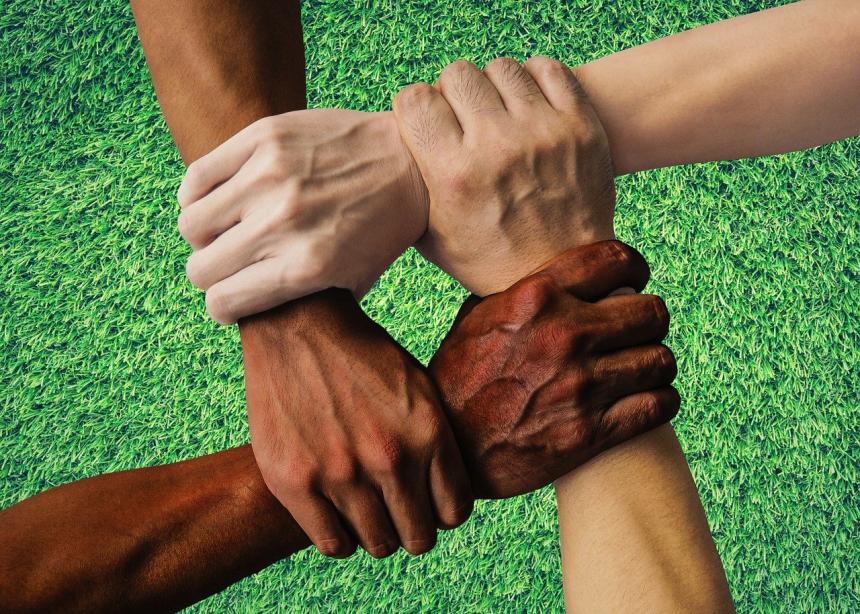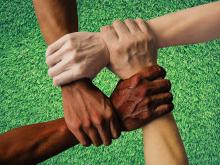As a young adult I entered a Mennonite college knowing little about Mennonites. I grew up (mostly) Baptist. I was astonished to hear people say over and over again, “You must be a Mennonite!” I sputtered that just because my last name is Klassen does not make me Mennonite, and that, in fact, I was a Christian who happened to be a member of a Baptist congregation.
“You can’t be a Mennonite!” That is what Ly Vang and her daughter have been told as they move in Mennonite circles in Ontario. Ly is an active member of First Hmong Mennonite Church in Kitchener, a member of the Joint Council of Mennonite Church Canada, and has been a Mennonite church member for about 40 years. She has been a Mennonite longer than I have been a Mennonite.
Ly has a generous spirit and does not hold bitterness towards those who make these statements. It is harder when her children and grandchildren, who were born into the Mennonite church community, are told the same thing.
How can this be in our MC Canada faith community today? Don’t we know that choosing to be a Mennonite is not about skin colour or names, but a specific part of the Christian faith tradition?
That is one layer of racism and prejudice that saddens and angers me, and it is very real.
There is another layer that is subtler. Who gets to be listened to as an authority on what it means to be a Mennonite Christian? Who gets to define and teach about our ecclesiological and theological understandings of our Mennonite faith? Why don’t we know more Mennonite theologians who do not carry Russian or Swiss surnames?
Ernie Harris is a member of the MC Eastern Canada Executive Council who happens to be Black. He wonders why we so often look to the Global South for stories about Mennonites of colour. Why don’t we have more stories about us, all of us, instead of about people in some other country?
I am trying to get my head and heart around what I might do about these barriers within our church. The MC Canada Joint Council is thinking about this. More anti-racism training? More benchmarks and accountability? More news and stories by, and about, the people of colour who are integral to the church? Will these have an impact on congregations across Canada?
Some days I am encouraged when I see more churches of colour in our regional churches. That is a start. But I know about, and worry about, glass ceilings. How do we build an intercultural church that welcomes all of its members as “real Mennonites”? That is what I yearn for, that our church would act like Acts 2, Ephesians 2 or Revelation 7.
Canada welcomes migrants from countries around the world. Unless you are Indigenous, your family entered this country as refugees or immigrants, as settlers. I am the second-generation born in Canada, so that history is known in my extended family. How many of our families brought exclusionist worldviews into this country? How many of our families brought a supremacist colonial view about the Indigenous people on whose land we settled?
My hope is that the church leads the way in building the Kingdom of God here on earth, specifically here in Canada. We come from many different places to live on treaty lands in Canada. We carry much responsibility to build a church that is responsive to the needs and challenges of this country in these times.
Arli Klassen is now a Mennonite, the moderator of MC Eastern Canada and a member of the MC Canada Joint Council.
Read more The Church Here and There columns:
‘A little mercy now’
The role of the church today?
Disillusionment and hope
Too much news?
Salt for the earth





Comments
I say "Amen!" to this article. I teach Anabaptist History and Theology and I open my class with a spoken word poem about how I came to be Anabaptist/Mennonite. I've pasted one line below. I completely understand how Mennonite became an ethnicity but our forebears did not die to cook a particular kind of soup. They died for the freedom to choose a particular kind of faith that threatened the status quo at the time.
I chose then, and I choose now, to be called Mennonite.
My sister, she’s not a Mennonite, even though she eats vereneki.
My pastor, she is a Mennonite, even though she’s a Yamasaki.
The rest of the poem can be found at https://garethbrandt.wordpress.com/2019/01/08/how-i-became-an-anabaptist-2/
Add new comment
Canadian Mennonite invites comments and encourages constructive discussion about our content. Actual full names (first and last) are required. Comments are moderated and may be edited. They will not appear online until approved and will be posted during business hours. Some comments may be reproduced in print.